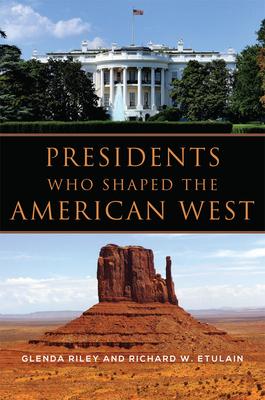
Book
Presidents Who Shaped the American West
(Write a Review)
Paperback
$27.72
Generations of Americans have seen the West as beyond federal control and direction. But the national government's presence in the West dates to before Lewis and Clark, and since 1789 a number of U.S. presidents have had a penetrating and long-lasting impact on the region. In Presidents Who Shaped the American West, noted historians Glenda Riley and Richard W. Etulain present startling analyses of chief executives and their policies, illuminating the long reach of presidential power. The authors begin each chapter by sketching a particular president's biography and explaining the political context in which he operated while in office. They then consider overarching actions and policies that affected both the nation and the region during the president's administration, such as Thomas Jefferson's augmentation of the West via the Louisiana Purchase, and Andrew Jackson's removal of American Indians from the Southeast to "Indian Country" in the West. Abraham Lincoln's promotion of the Homestead Act, a transcontinental railroad, and western territories and states free of slavery marked further extensions of presidential power in the region. Theodore Roosevelt's conservation efforts and Jimmy Carter's expansion of earlier policies reflected growing public concern with the West's finite natural resources and fragile natural environment. Franklin D. Roosevelt's New Deal, Dwight D. Eisenhower's highway program, and Lyndon B. Johnson's Great Society funneled federal funding into the West. In return for this largesse, some argued, the West paid the price of increased federal hegemony, and Ronald Reagan's presidency arguably curbed that power. Riley and Etulain also discuss the most recent presidential terms and the region's growing political power in Congress and the federal bureaucracy. With an accessible approach, Presidents Who Shaped the American West establishes the crucial and formative nature of the relationship between the White House and the West--and will encourage readers to continue examining this relationship.
Generations of Americans have seen the West as beyond federal control and direction. But the national government's presence in the West dates to before Lewis and Clark, and since 1789 a number of U.S. presidents have had a penetrating and long-lasting impact on the region. In Presidents Who Shaped the American West, noted historians Glenda Riley and Richard W. Etulain present startling analyses of chief executives and their policies, illuminating the long reach of presidential power. The authors begin each chapter by sketching a particular president's biography and explaining the political context in which he operated while in office. They then consider overarching actions and policies that affected both the nation and the region during the president's administration, such as Thomas Jefferson's augmentation of the West via the Louisiana Purchase, and Andrew Jackson's removal of American Indians from the Southeast to "Indian Country" in the West. Abraham Lincoln's promotion of the Homestead Act, a transcontinental railroad, and western territories and states free of slavery marked further extensions of presidential power in the region. Theodore Roosevelt's conservation efforts and Jimmy Carter's expansion of earlier policies reflected growing public concern with the West's finite natural resources and fragile natural environment. Franklin D. Roosevelt's New Deal, Dwight D. Eisenhower's highway program, and Lyndon B. Johnson's Great Society funneled federal funding into the West. In return for this largesse, some argued, the West paid the price of increased federal hegemony, and Ronald Reagan's presidency arguably curbed that power. Riley and Etulain also discuss the most recent presidential terms and the region's growing political power in Congress and the federal bureaucracy. With an accessible approach, Presidents Who Shaped the American West establishes the crucial and formative nature of the relationship between the White House and the West--and will encourage readers to continue examining this relationship.
Paperback
$27.72